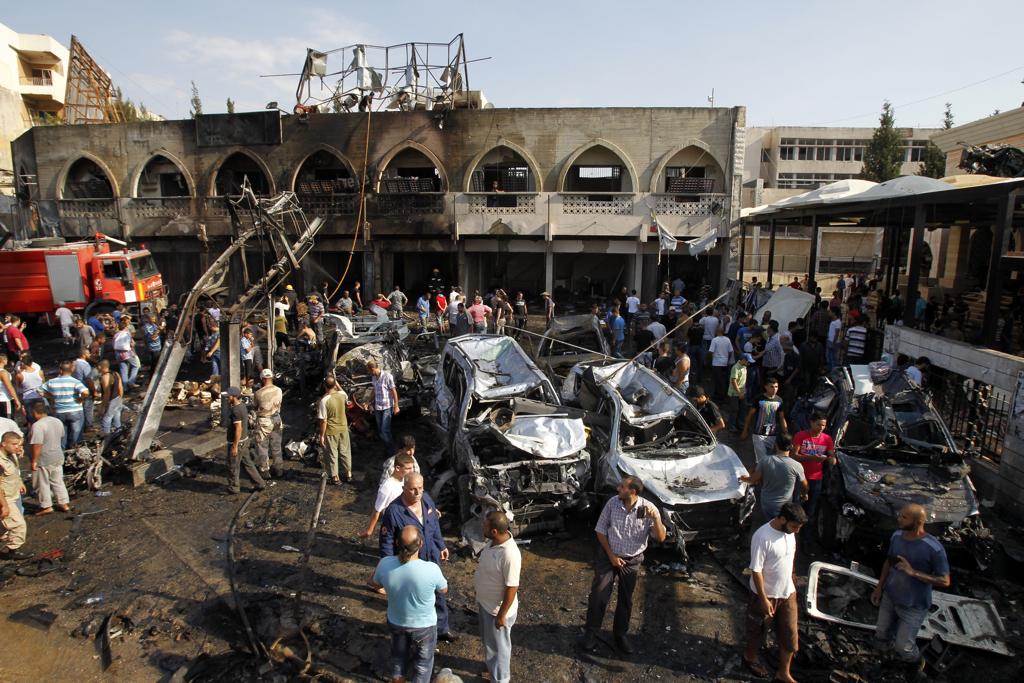Lebanon explosions: Is it different this time?
Lebanese civilians gather next to the site of a blast outside the Al-Taqwa mosque in the northern city of Tripoli on August 23, 2013.
BEIRUT, Lebanon — Lebanon is no stranger to bombs.
But in the past, explosions were normally used to carry out targeted assassinations.
Today’s twin car bombings in Lebanon’s second-largest city, Tripoli, detonated around 2 p.m. outside two popular Sunni mosques where worshippers had gathered for Friday prayers, killing 42 and injuring at least 500 more.
The attack appeared to target civilians of a particular identity — Islam’s Sunni sect — just eight days after a car bomb killed 30 in a predominantly Shia neighborhood in south Beirut, where support for the Shia militant group Hezbollah is strong.
On Friday, there were fears Lebanon could be descending into the kind of tit-for-tat sectarian violence common in Iraq.
“Lebanon stands at a crossroads with the threat of civil war looming,” said Imad Salamey, an associate professor of political science at Beirut’s Lebanese American University.
A Tripoli-based journalist, Ibrahim Chalhoub, said Sunni gunmen had deployed around the city.
The mosques hit were where two of Tripoli’s most prominent Salafi, or hardline Sunni, preachers — Sheikh Bilal Baroudi and Sheikh Salem al-Rifai — give their sermons. The sheikhs, who are said to have survived the bombings, strongly support Syria’s rebels and are known for their anti-Hezbollah rhetoric.
Geographically, culturally and politically close to Syria, many of Tripoli’s residents identify closely with Syria’s Sunni-majority rebels who are fighting the regime of Bashar al-Assad, a member of the Shia offshoot Alawite sect.
In Tripoli’s Sunni neighborhoods, posters of slain fighters hang from buildings alongside Islamist and Free Syrian Army flags.
As Lebanon’s hub of Sunni militancy, militias here have regularly fought gunmen from Tripoli’s Alawite minority since the conflict in Syria began.
The violence has resulted in a tense frontline in the city, packed with sandbagged firing positions and buildings wrecked by gunfire, rocket-propelled grenades and mortars.
While the Sunni-Alawite conflict in the city predates the Syrian civil war, fighting has increased in frequency and intensity over the past two years.
“This is a clear statement against the Salafis because both mosques are of a very big importance,” Chalhoub, the journalist, said.
Many Sunnis in Tripoli were quick to point the blame at Hezbollah and the Syrian government.
“It’s an attack against the house of Allah from the Syrian regime, they want to continue the fight,” said Omar Bakri, a radical Sunni preacher based in the city.
Hezbollah condemned the bombing soon after it happened.
But increasingly, some Sunni militants have encouraged directly confronting Hezbollah, a group they see as unfairly in control of the Lebanese state and security forces.
When Hezbollah publicly announced its military involvement in Syria, and its forces broke rebel lines and captured the strategic Syrian city of Qusayr in June, tensions rose further.
More from GlobalPost: Hezbollah ups the ante, helps rout Syrian rebels
After last week’s bomb in Beirut, Hezbollah leader Hassan Nasrallah announced that the group believed that Sunni extremists were behind the attack on the Shia-majority neighborhood.
He called on Lebanon to confront the perpetrators and also reaffirmed Hezbollah’s commitment to involvement in Syria’s civil war.
Soon after today’s attacks, sources in Tripoli’s Alawite neighborhood of Jabal Mohsen claimed Sunni militias had opened fire on their area. But the violence did not escalate.
“People are still in shock,” Bakri said.
